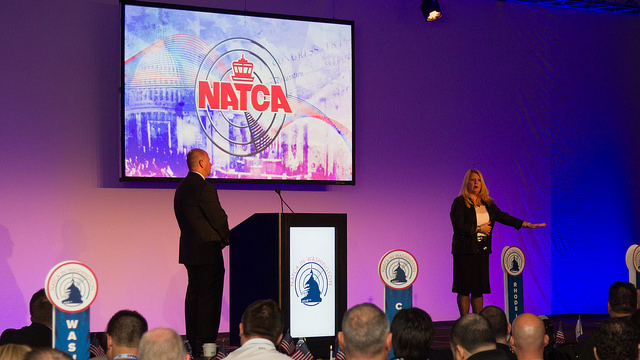
May 26, 2017 // NiW 2017: Rinaldi and Gilbert Welcomed Attendees
“It is you helping us elevate this organization for the past 30 years,” Rinaldi said. “The fights are always in front of us. During the last 30 years we have always been on the Hill, showing some type of presence.”
Gilbert told attendees the story of NATCA’s legislative situation in 2006 when the FAA was preparing to impose the White Book. While researching a topic recently, Gilbert said she came across the speech she delivered to the 2006 Biennial Convention in Boston as the Chair of the National Legislative Committee. She read the speech aloud to the NATCA in Washington attendees, which detailed the Union’s mission to restore fair collective bargaining rights.
In one passage of that speech, Gilbert’s words can be applied to today’s legislative activism as much as it was 11 years ago.
“Do not for a minute think that our task is impossible and all is lost because once you do, they win,” she said. “I need you, the legislative team needs you, this Union needs you.”
By calling, writing, and visiting members of Congress and their staffs, both in Washington, D.C., and back in their home districts, Gilbert said it would create opportunities for producing meaningful interactions and results. “You do not know what or where something may happen that could make the difference,” she said.
For example, Gilbert said, NATCA efforts in 2006 did not result in legislation that protected the Union. But it sparked the beginning of a multi-year effort that led to changes in Congress and, ultimately, spurred legislation that would prevent the FAA from imposing a contract again.
 Rinaldi reported to attendees that every NATCA-represented bargaining unit is under contract through President Trump’s first term. But he urged them to stay vigilant and remain focused on how legislative issues that arise will affect NATCA members’ pay and benefits.
Rinaldi reported to attendees that every NATCA-represented bargaining unit is under contract through President Trump’s first term. But he urged them to stay vigilant and remain focused on how legislative issues that arise will affect NATCA members’ pay and benefits.
Coming just a few days after Rinaldi testified at a House Transportation and Infrastructure Committee hearing on FAA and ATC reform, he and Gilbert detailed the many reasons why the status quo is unacceptable. They educated attendees on how NATCA remains focused on the need for a stable, predictable funding stream and that their “Ask” of lawmakers this week was about funding. They told attendees that NATCA continues to await details of expected legislation to reform the FAA and the ATC system, but that our position remains the same: NATCA will evaluate the details of any proposal, applying the Union’s Four Core Principles of Reform:
- Protecting the men and women who ensure the safety and efficiency of the National Airspace System (NAS) in their employment relationship, including their rights and benefits;
- Ensuring that safety and efficiency remain the top priorities;
- Providing a stable, predictable funding stream that adequately supports air traffic control services, staffing, hiring and training, long-term modernization, preventative maintenance, and ongoing modernization of the physical infrastructure; and
- Ensuring continued service to all segments of our nation’s diverse aviation community.
“NATCA is for the safety of the National Airspace System and the people who keep it safe,” Gilbert said. “It’s better for us to be in the room, able to articulate our needs, rather than outside the room screaming to be heard.”
Rinaldi pointed out that NATCA represents 75 percent of the total number of FAA employees who are members of a union.
“We represent the greatest workforce in the world and we are trying to protect the greatest workforce in the world,” Rinaldi said. “At the end of the day you have to be at the table to control your destiny. We want to have a say in what the future looks like.”

